Wassen
Wassen is a municipality in the canton of Uri in Switzerland.
Wassen | |
|---|---|
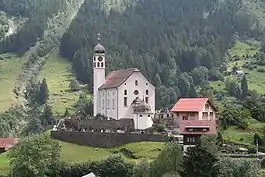 | |
 Coat of arms | |
Location of Wassen 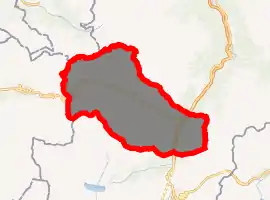
| |
 Wassen 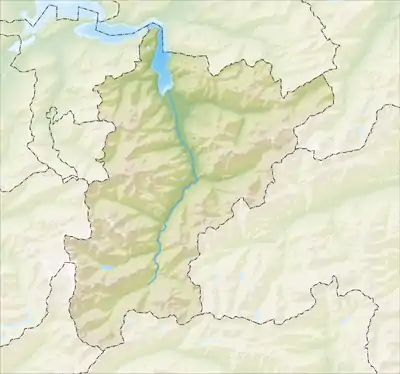 Wassen | |
| Coordinates: 46°42′N 8°35′E | |
| Country | Switzerland |
| Canton | Uri |
| District | n.a. |
| Area | |
| • Total | 96.88 km2 (37.41 sq mi) |
| Elevation | 930 m (3,050 ft) |
| Population (2018-12-31)[2] | |
| • Total | 398 |
| • Density | 4.1/km2 (11/sq mi) |
| Time zone | UTC+01:00 (Central European Time) |
| • Summer (DST) | UTC+02:00 (Central European Summer Time) |
| Postal code(s) | 6484 |
| SFOS number | 1220 |
| Surrounded by | Attinghausen, Engelberg (OW), Erstfeld, Gadmen (BE), Göschenen, Gurtnellen |
| Website | www SFSO statistics |
Geography

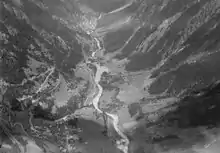
Wassen has an area, as of 2006, of 97 km2 (37 sq mi). Of this area, 12.5% is used for agricultural purposes, while 18.2% is forested. Of the rest of the land, 1.1% is settled (buildings or roads) and the remainder (68.1%) is non-productive (rivers, glaciers or mountains).[3] In the 1993/97 land survey, 9.6% of the total land area was heavily forested, while 6.8% is covered in small trees and shrubbery. Of the agricultural land, 2.5% is used for orchards or vine crops and 10.1% is used for alpine pastures. Of the settled areas, 0.2% is covered with buildings, and 0.8% is transportation infrastructure. Of the unproductive areas, 0.1% is unproductive standing water (ponds or lakes), 1.2% is unproductive flowing water (rivers), 48.5% is too rocky for vegetation, and 18.3% is other unproductive land.[4]
It is on the Gotthard line and the rail line makes a double loop near Wassen to help the trains deal with the climb. The Susten Pass connects Wassen with Innertkirchen.
Demographics
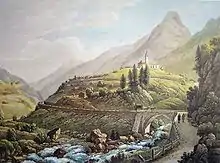
Wassen has a population (as of 31 December 2019) of 405.[5] As of 2007, 7.2% of the population was made up of foreign nationals. Over the last 10 years the population has decreased at a rate of -16%. Most of the population (as of 2000) speaks German (94.2%), with Serbo-Croatian being second most common (2.4%) and Italian being third (1.3%).[3] As of 2007 the gender distribution of the population was 51.8% male and 48.2% female.[6]
In the 2007 federal election the FDP party received 85.9% of the vote.[3]
In Wassen about 53% of the population (between age 25-64) have completed either non-mandatory upper secondary education or additional higher education (either university or a Fachhochschule).[3]
Wassen has an unemployment rate of 0.64%. As of 2005, there were 43 people employed in the primary economic sector and about 18 businesses involved in this sector. 34 people are employed in the secondary sector and there are 7 businesses in this sector. 121 people are employed in the tertiary sector, with 18 businesses in this sector.[3]
The historical population is given in the following table:[7]
| year | population |
|---|---|
| 1970 | 764 |
| 1980 | 671 |
| 1990 | 545 |
| 2000 | 465 |
| 2005 | 466 |
| 2007 | 456 |
References
- "Arealstatistik Standard - Gemeinden nach 4 Hauptbereichen". Federal Statistical Office. Retrieved 13 January 2019.
- "Ständige Wohnbevölkerung nach Staatsangehörigkeitskategorie Geschlecht und Gemeinde; Provisorische Jahresergebnisse; 2018". Federal Statistical Office. 9 April 2019. Retrieved 11 April 2019.
- Swiss Federal Statistical Office accessed 09-Sep-2009
- Canton Uri - Ground use statistics (in German) accessed 8 September 2009
- "Ständige und nichtständige Wohnbevölkerung nach institutionellen Gliederungen, Geburtsort und Staatsangehörigkeit". bfs.admin.ch (in German). Swiss Federal Statistical Office - STAT-TAB. 31 December 2019. Retrieved 6 October 2020.
- Uri Population statistics (in German) accessed 8 September 2009
- Uri in Numbers 2009/10 edition (in German) accessed 8 September 2009
| Wikimedia Commons has media related to Wassen. |
